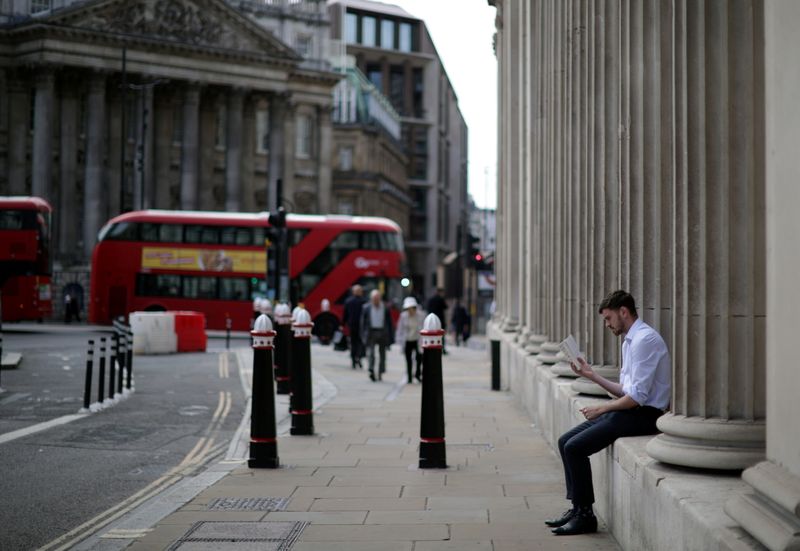By David Milliken and Andy Bruce
LONDON (Reuters) -British public borrowing declined by less than expected in August, government figures showed on Tuesday, highlighting the hefty ongoing costs of the COVID-19 pandemic and a rise in debt interest payments as inflation picked up.
Public sector net borrowing, excluding state-controlled banks, fell to 20.5 billion pounds ($28.0 billion) in August, down 21% from August a year earlier, but well above economists' average 15.6 billion pound forecast in a Reuters poll.
British government borrowing soared last financial year because of heavy spending due to COVID-19, hitting its highest since World War Two at 15.5% of gross domestic product, up from an earlier estimate of 14.2%.
The ONS said this upward revision reflected higher estimates for the cost of a COVID-19 loan guarantee scheme and public-sector pensions.
Finance minister Rishi Sunak will unveil new budget and growth forecasts on Oct. 27, as well as new multi-year spending limits for individual government departments and potentially some longer-term fiscal goals.
Spending has fallen sharply during the current financial year, due in large part to a big drop in the number of people receiving job furlough payments and similar support for the self-employed.
Borrowing for the first five months of the 2021/22 financial year totalled 93.8 billion pounds, down by almost half on the same period a year earlier.
A big drop in furlough payments - which stop this month - and similar reduction in support for the self-employed was the biggest cause of the fall in spending.
But higher interest payments on inflation-linked government bonds had pushed up debt servicing costs in August and were likely to increase as inflation rose further in months to come, said Samuel Tombs, economist at Pantheon Macroeconomics.
Debt costs last month added up to 6.3 billion pounds, twice their level a year ago. Measured as a share of GDP, debt interest costs still remain low by historic standards.
Public debt as a share of gross domestic product rose to 2.023 trillion pounds or 97.6% of GDP in August, the highest ratio since March 1963.
RISING TAXES
Earlier this month the government announced it would increase the rate of payroll taxes paid by both employers and employees by 1.25 percentage points each, to fund greater health spending and long-term social care costs.
"We are determined to get our public finances back on track - that's why we have set out the focused and responsible steps we are taking to keep debt under control," Sunak said on Tuesday.
Analysts see Britain's tax burden rising to a record high for peacetime when the tax rises take effect.
Last week the Financial Times reported that Sunak would set out a target of ending borrowing for day-to-day spending within three years, and also aim to ensure that a measure of underlying public debt started falling by the 2024/25 tax year.
"We expect a fiscally-neutral package of measures in next month's Budget, with any small windfall from modestly upgraded GDP forecasts earmarked for a possible relaxation of the fiscal squeeze in the run-up to the next general election, which is due to be held in May 2024," Pantheon's Tombs said.

Britain's finance ministry said no decisions had been taken, beyond Sunak's pre-existing goal of putting the public finances on a more sustainable footing.
($1 = 0.7317 pounds)